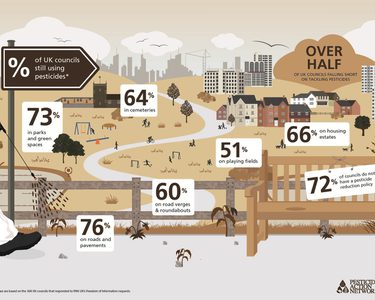UK’s largest pesticide survey shows half of councils still using pesticides

Parks, pavements and playgrounds across the UK were sprayed with more than 350 tonnes of pesticides in 2024 – according to the largest ever UK-wide survey on pesticide use by local authorities.
New research by the Pesticide Action Network (PAN UK) – a collation of environmental organisations and charities including Garden Organic - has revealed that councils used roughly the equivalent of 23 double-decker buses of pesticides last year, with the majority of these toxic chemicals used to remove unwanted plants, usually for cosmetic reasons.
PAN UK's 368 Freedom of Information Requests to UK Councils show most councils continue to apply pesticides in public spaces such as parks, playgrounds, pavements, playing fields and housing estates.
Data shows the weedkiller glyphosate is by far the most widely used pesticide in urban areas. Glyphosate has been linked repeatedly to cancers and other diseases.
- 73% of councils continue to use pesticides in parks and green spaces
- 76% on roads and pavements
- 66% on housing estates
- 64% in cemeteries
- 52% on playing fields
- 72% of councils do not have a pesticide reduction policy
Why are pesticides so damaging?
The UK is one of the most nature depleted countries in the world and the overuse of pesticides has been linked to major declines in wildlife, including birds, bees and hedgehogs. Pesticides used on pavements and paths will often run off these hard surfaces, further contributing to the contamination of the UK’s rivers and other water bodies.
The good news is that the pesticide-free movement is growing, with 45% of UK councils taking action to end or reduce pesticide use.
A decade ago, most residents were unaware that pesticides were used in villages, towns and cities. Now, thanks to campaigners across the country, there are more than 100 councils taking action to protect the health of residents, wildlife and pets.
What can you do to stop pesticide use?
Head to the PAN UK website to:
- Find out if your council is making progress on tackling their use of pesticides via a searchable database.
- Read the full report featuring analysis of pesticide use by UK councils.
- Click the e-action enabling you to contact your local councillors to call on them to stop using pesticides.
Nick Mole, policy officer at PAN UK says: “Pesticide use in public spaces only makes up around 10% of the UK’s total usage but – because we are now such an urban population – it’s the second most common route of exposure after diet.
"There are plenty of non-chemical alternatives available and dozens of councils proving every day that going pesticide-free is entirely possible. Given the global biodiversity crisis and rising rates of chronic diseases such as cancer and Parkinson’s, removing these toxic chemicals from the places where we live, work and play should be a no brainer.”
Find out more about the dangers of pesticides, and what you can do in your garden to stop using them, via our pesticide hub page.